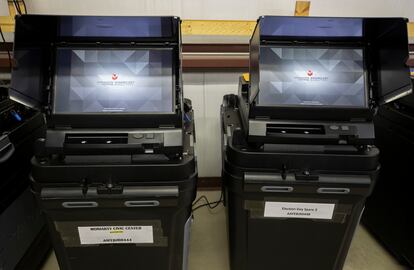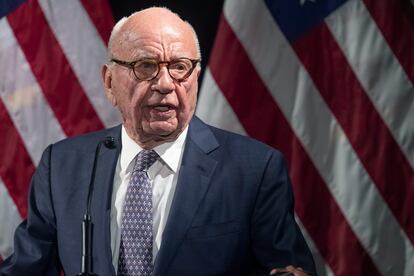Dominion defamation case: Fox’s election lies go on trial
Rupert Murdoch’s network has been accused of defaming the voting machine company by spreading false accusations of voter fraud in the 2020 presidential election. Opening arguments have been delayed while a last-minute deal is negotiated


Dominion Voting Systems’ defamation case against Fox News will go to trial this week in Wilmington, Delaware. The trial is based on the fact — established by a judge — that the TV network and its star presenters, guests and commentators relentlessly spread the lie that the 2020 U.S. presidential election had been stolen from former president Donald Trump and that Dominion’s voting machines were responsible for rigging the vote. The question facing jurors is whether the ultra-conservative television network controlled by media tycoon Rupert Murdoch defamed the company by airing the bogus allegations. Dominion is suing Fox News for $1.6 billion, but there’s more than money at stake: the jurors will be assessing the limits of freedom of expression in times of disinformation and media manipulation.
Without these false allegations of voter fraud, it would be difficult to explain the assault on the Capitol on January 6, 2021, or why many Republican voters don’t believe that Joe Biden won the 2020 election fairly, or why Trump — who already tried to raise doubts about Barack Obama’s victory in 2012 — remains the favorite politician of his party’s rank and file.
In principle, what will be judged in the coming weeks in Wilmington — the adoptive city of Biden — are not the consequences of these lies, but whether Fox spread them with “actual malice.” In other words, if the network knew it was lying or recklessly misrepresenting the truth. The trial was scheduled to begin Monday, but the court announced Sunday night that it had been postponed by one day. While the court gave no reason for the postponement, sources quoted by The Washington Post say that the two parties are looking to reach a last-minute agreement.
In its lawsuit, Dominion Voting Systems maintains that Fox preferred to pander to its Trump-supporting viewers and air voter fraud conspiracy theories than tell the truth. Fox argues that the allegations of electoral fraud from Trump and his allies were newsworthy material that had to be covered.
But the preliminary investigation ahead of the trial, which presented affidavits, email and telephone messages and other documents, has not put the network in a good position. The revelations of the probe have cast an unwelcome light on the inner workings of Fox, which is the most influential conservative news outlet in the United States, reaching 75 million subscribers across the country.

The first interview that Donald Trump gave after his indictment was with Fox News’ star presenter Tucker Carlson. Carlson rolled out the red carpet for the former president and did not raise a single challenging question. He sounded like Trump’s most avid admirer. But text messages presented during the defamation investigation paint a different picture of his feelings. “We are very, very close to being able to ignore Trump most nights,” he wrote. “I truly can’t wait.” “I hate him passionately,” he wrote in another text message.
Carlson, at least, said that he suspected there was electoral fraud in the 2020 elections. Court filings, however, reveal that most Fox presenters and Murdoch himself did not. In sworn questioning in January, Dominion’s lawyers asked Murdoch: “Do you believe that the 2020 presidential election was free and fair?” “Yes,” he replied. “The election was not stolen,” he added, according to the case documents. Fox executives, however, realized that their viewers wanted to hear the election lies, and repeated them endlessly.
On election night, television networks deploy large teams to determine when a candidate has won a state based on statistical models, and compete to be the first to call a winner. Fox’s team — its so-called Decision Desk — was the first to declare Biden the winner in Arizona, ahead of rival networks and the near-infallible Associated Press.
That Fox win — a journalistic triumph — infuriated Trump and his team. The defeat in Arizona left him with almost no chance of being re-elected president. Fox viewers did not like the news either. “I hate our Decision Desk people!” Rupert Murdoch wrote on November 7, the night that Biden was announced the winner of the 2020 election. Meanwhile, Newsmax, a new TV network founded by a former Murdoch executive, was gaining audiences for refusing to declare Biden the winner, which attracted Trump’s staunchest supporters to the channel.

As part of the defamation case, Fox has been forced to hand over Murdoch’s communications on the matter. The media mogul sent an email warning about a story published in his own newspaper, The Wall Street Journal, concerning Trump’s intentions to favor Newsmax. “These people should be watched, if skeptically,” he wrote. Murdoch also commented on the press conference given by Trump’s lawyer, Rudy Giuliani, who espoused conspiracy theories as his hair dye dripped down his face. In a message to Suzanne Scott, the CEO of Fox News, he wrote that the allegations were “terrible stuff damaging everybody, I fear. Probably hurting us too.”
In the press conference, Giuliani accused Dominion of rigging the election — false allegations which led company workers to receive death threats. He also blamed another voting machine company, Smartmatic, which is suing Fox News for $2.7 billion in a case that is still pending.
In those weeks, Murdoch, his son Lachlan and Suzanne Scott held various meetings about how the network should act. “They discussed the mounting viewer backlash to Fox, how to win back viewers (including by not booking Democratic guests), and the direction that Fox should take,” the Dominion lawsuit states. There were also discussions and exchanges between presenters and journalists that have now come to light.
“We don’t want to antagonize Trump further,” Murdoch said in a message dated November 16. When questioned in the preliminary proceedings of the case, Murdoch explained: “[Trump] had a very large following, and they were probably mostly viewers of Fox, so it would have been stupid.” “Lots of sane Fox viewers still believe in Trump,” he said at another point.
It may seem cynical to spread lies to retain viewers, but Murdoch claimed that the network was simply reporting the news. “We report the news, and we have dozens of people a day on the channels that are talking about the news. And this was big news. The president of the United States was making wild claims, but that is news,” he said under oath. But during the sworn questioning, Murdoch admitted that Fox presenters were endorsing the voter fraud lies.
The 12-person jury hearing the trial does not have to decide whether Fox acted ethically, but whether it exceeded the legal bar for defamation. Since the Supreme Court made its landmark 1964 ruling in The New York Times v. Sullivan, to sustain a claim of defamation, the First Amendment requires that the plaintiff knew it was lying and did so with “actual malice.” That is what the Delaware jury has to decide. In the previous proceedings, the judge said that it was “crystal clear” that the allegations against Dominion were false. A jury must now decide whether Fox knowingly spread the allegations, with reckless disregard as to whether they were true or not.

The trial will begin with the lawyers’ opening arguments, followed by witness testimony. Fox News stars Tucker Carlson and Sean Hannity and founder Rupert Murdoch are among the people expected to testify over the next few weeks. The case will be decided by the 12-person jury, which was selected last week from a clearly Democratic constituency.
Meanwhile, Delaware Superior Court Judge Eric Davis has closed the door to one of Fox’s main lines of defense: that Trump’s election lies were newsworthy. “Just because someone is newsworthy doesn’t mean you can defame someone,” Davis told Dominion and Fox’s lawyers, according to The New York Times. In another controversial decision, the judge also ruled that Fox was responsible for what some of its guests said. And, in the pre-trial hearings, Davis also said that it was not enough for other guests to provide a countering view.
It is a sensitive issue, and legal experts are divided on which outcome would be best for free speech. Some experts say that if the lawsuit fails, despite all its evidence, it could fuel further misinformation and disinformation. It may also send the message to victims of defamation that the media are too well-protected to take on. Some justices of the Supreme Court, where the case may end up, are in favor of revising the precedent set by The New York Times v. Sullivan.
Other lawyers, on the other hand, believe that if Fox loses, it could trigger a wave of lawsuits that would force the media to reveal the criteria they use in their coverage and condition how they report the news. According to these lawyers, even falsehoods must sometimes be protected.
Sign up for our weekly newsletter to get more English-language news coverage from EL PAÍS USA Edition
Tu suscripción se está usando en otro dispositivo
¿Quieres añadir otro usuario a tu suscripción?
Si continúas leyendo en este dispositivo, no se podrá leer en el otro.
FlechaTu suscripción se está usando en otro dispositivo y solo puedes acceder a EL PAÍS desde un dispositivo a la vez.
Si quieres compartir tu cuenta, cambia tu suscripción a la modalidad Premium, así podrás añadir otro usuario. Cada uno accederá con su propia cuenta de email, lo que os permitirá personalizar vuestra experiencia en EL PAÍS.
¿Tienes una suscripción de empresa? Accede aquí para contratar más cuentas.
En el caso de no saber quién está usando tu cuenta, te recomendamos cambiar tu contraseña aquí.
Si decides continuar compartiendo tu cuenta, este mensaje se mostrará en tu dispositivo y en el de la otra persona que está usando tu cuenta de forma indefinida, afectando a tu experiencia de lectura. Puedes consultar aquí los términos y condiciones de la suscripción digital.








































